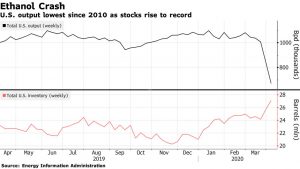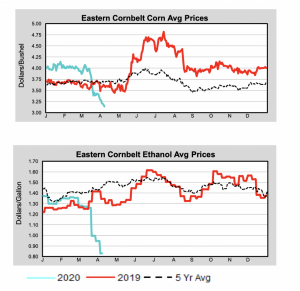A prolonged military conflict in the Middle East could potentially upend key commodity markets due to Iran’s control of the Strait of Hormuz, one of the world’s most important trade…
COVID-19 Hampers Some Markets, as Worker Safety and Well-Being Garner Increased Attention
DTN Ag Policy Editor Chris Clayton reported this week that, “As meatpacking plants and other food processors reduce capacity or temporarily close because of coronavirus cases, Vice President Mike Pence pointed to the vital nature of the food industry and told those workers ‘to show up and do your job’ to keep grocery shelves stocked.
“Pence spoke at Tuesday evening’s White House press conference about the challenges facing health-care workers. But then he shifted to the importance of the food supply, pointing to ‘the farmers and the ranchers, to our processors, to our distributors, to our truckers, to our grocers, Americans are keeping food on the table for our fellow Americans.’ Pence later added, ‘They are truly inspiring heroes.'”
Today, I spoke to over 500 small business owners as well as food supply industry leaders. From farmers & ranchers to distributors & truckers, Americans are keeping food on the table for families around the Nation. Because of you, Americans have one less worry & we thank you. pic.twitter.com/RSsS0kUGVn
— Mike Pence (@Mike_Pence) April 8, 2020
Mr. Clayton explained that, “Packing plants around the country are increasingly struggling with positive coronavirus cases. Tyson Foods and National Beef on Monday announced they were temporarily suspending operations at a pork plant and beef plant in Iowa, respectively. Tyson had reported 24 positive cases at its pork plant in Columbus Junction, Iowa.”
Reuters writer Tom Polansek reported this week that, “Cargill Inc closed a U.S. meat plant until further notice on Tuesday, the company said, disrupting the food supply for grocery stores that have seen demand surge as the country battles the new coronavirus.
“The facility in Hazleton, Pennsylvania, produces meat for retail food customers, Cargill said in a statement. The products include ground beef, steaks, beef roasts and pork products that are sold at grocery stores across the country, according to the company’s website.”
And Cuyler Meade reported this week at the Greeley (Colo.) Tribune Online, “As criticism and concerns flow out from inside the JBS Swift meat packing plant in Greeley about the county’s largest employer’s response to the COVID-19 pandemic crisis, the man running the company remains extremely confident that his people are putting appropriate and effective measures in place to take care of several thousands of employees.
“‘We have three very clear priorities,’ said Andre Nogueira, president and CEO of JBS USA Tuesday. ‘The first, most importantly, is our team members’ safety. That’s the top priority. The second priority is to produce food in a very unique, unsettled time for all of us; as food production, we have a big, big responsibility. And the third priority is to keep the jobs and the benefits for the team members in a time where we’re seeing huge unemployment around the globe. The whole team is focusing on these three priorities.'”
Also this week, Bloomberg writers Isis Almeida and Lydia Mulvany reported that, “At least three people who worked at plants owned by top U.S. meat packer Tyson Foods Inc. and a local unit of Brazil’s JBS SA were reported to have died from the pandemic. Companies including Cargill Inc., Sanderson Farms Inc. and Perdue Farms Inc. have also reported infections.
“While it’s unclear whether the deaths had anything to with their workplace, the news exposes the fragility of global supply chains that are needed to keep grocery stores stocked after panic buying left shelves empty. Vice President Mike Pence said Tuesday that these workers are ‘vital,’ calling on them to ‘show up and do your job’ to keep the nation fed.
Plants across the U.S. are starting to reduce output or idle as cases spread from the main cities to rural America. Outbreaks have occurred in factories across the country in recent weeks, with hundreds of workers being sent home.
The COVID-19 outbreak continues to negatively permeate markets that are important to the farm sector.
Bloomberg writer Michael Hirtzer reported on Wednesday that, “The American ethanol industry is cutting production like never before as coronavirus lockdowns keep drivers off the roads, crushing demand for fuel.
“Output of corn-based biofuel plunged by a record 20% to an average daily rate of 672,000 barrels. That’s the lowest rate since the Energy Information Administration began publishing weekly data in mid-2010. Stockpiles jumped to a record 27 million barrels, underscoring the demand struggles.”

Des Moines Register writer Donnelle Eller reported on Tuesday that, “Renewable fuels production has dropped about 50% in Iowa through a combination of shutdowns and reduced output, the Iowa Renewable Fuels Association estimates. Most of the production cut comes from ethanol, the organization said.
“‘I know of at least seven ethanol plants and two biodiesel plants have shuttered, and I assume there are more,’ said Monte Shaw, the association’s executive director.
“The impact is significant in Iowa, the nation’s largest producer of ethanol and biodiesel. About half of the state’s corn production typically is used each year to make ethanol, and oil from its soybeans goes into biodiesel.”

And Reuters writers Stephanie Kelly and Tom Polansek reported this week that, “A slew of U.S. ethanol plants have shut down as fuel demand has collapsed during the coronavirus outbreak, and meatpackers have been hit by a worrying side-effect: less carbon dioxide is now available to chill beef, poultry and pork.
“‘We’re headed for a train wreck in terms of the CO2 market,’ said Geoff Cooper, president of the Renewable Fuels Association industry group. The RFA said 29 of the 45 U.S. ethanol plants that sell carbon dioxide, or CO2, have idled or cut rates. The U.S. ethanol sector is the top supplier of commercial carbon dioxide to the food industry, accounting for around 40% of the market, according to the American Farm Bureau Federation.
That has put the U.S. meat industry on high-alert. It uses carbon dioxide as a refrigerant and preservative for meat, and also uses the gas to stun animals before slaughter.
Also this week, Bloomberg writers Isis Almeida, Agnieszka de Sousa, and Megan Durisin reported that, “Just as virus-spooked consumers have rushed to grocery stores to stockpile everything from toilet paper to pasta, farmers raising America’s cattle, hogs, and chickens have filled their bins with feed, fearing the spread of the coronavirus would disrupt their supply chains. ‘I’ve had some calls from customers of mine looking for feed because the mills are out,’ says the Fayetteville, Ark.-based Beaver. ‘There’s a rush to buy just because of the uncertainty in the market. They just don’t want to be caught without.'”
The Bloomberg writers explained that, “Keeping America’s 95 million cows, 77 million pigs, and 9 billion chickens fed isn’t as simple as it may seem. Farmers are worried their feed mills could close as employees get sick or that their slaughterhouses could slow production, forcing them to keep animals for longer. They’re also concerned that a shortage of trucks, which are being waylaid to supply supermarkets, could make it harder for farm supplies to reach them.
Even the plunge in gasoline demand affects the feed supply. As ethanol plants shut down—because the fuel additive isn’t needed when gas isn’t selling—the animal feed market is being starved of an important ingredient called dried distillers grains (DDGs) that are a byproduct of ethanol production. Distillers grain is a key ingredient in rations for beef cattle and dairy cows.
More broadly with respect COVID-19 and Rural America, The New York Times this week published an Online graphical map, titled: “Coronavirus Was Slow to Spread to Rural America. Not Anymore.”





